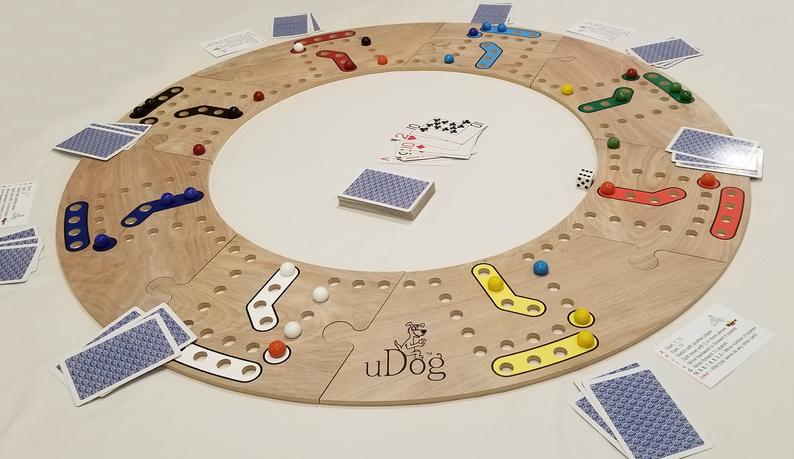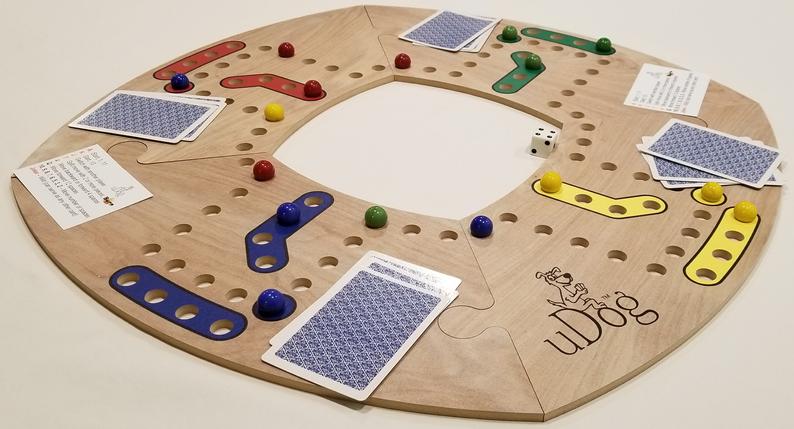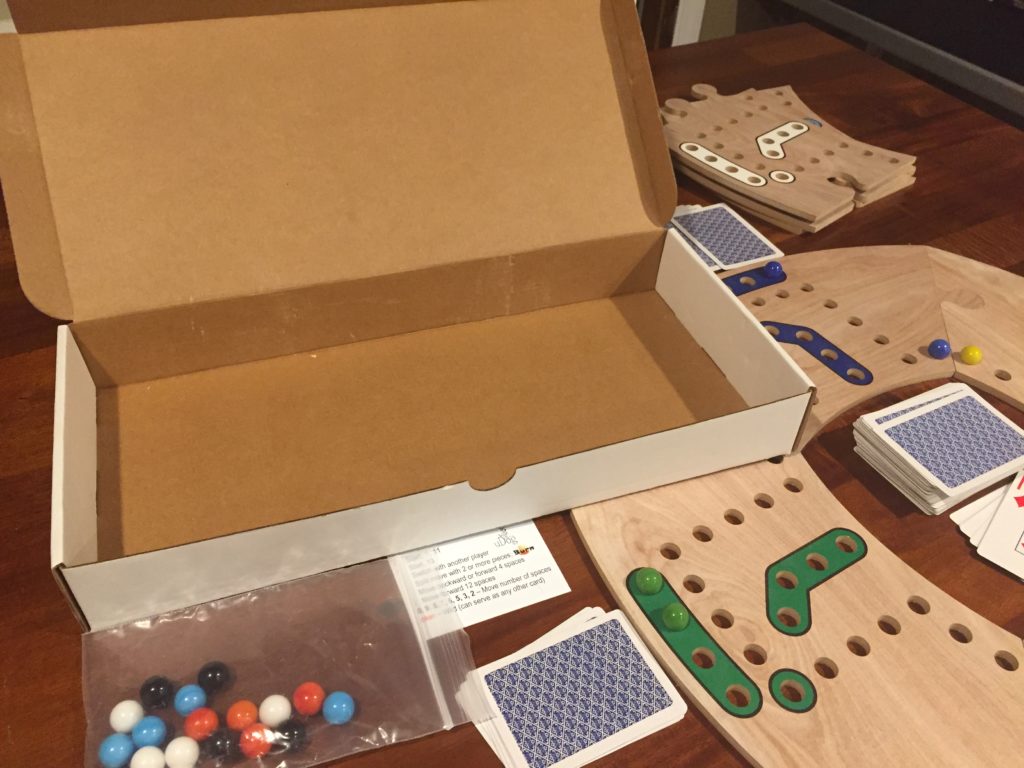I’m a kid of the 80’s, so I’m no stranger to games like “Sorry!” and “Trouble”. Enter, “uDog”: a relatively casual game that takes a lot of inspiration from the aforementioned games. Your team’s job is to get all of your marbles from their “kennel” to their home spaces before anyone else. It supports anywhere from 2-8 players, depending on the model that you buy (more on that in a bit). Before we begin I’m required by FCC regulations to disclose that I was paid to cover this game, though any and all opinions are my own.
Let’s start with the pricing model. At $55 plus shipping, you’ll receive the 4 player version and any modular boards required to make that happen (in this case, the larger boards). $75 plus shipping will net you a 6 player version, while $95 plus shipping will net you the 8 player version. The 6 and 8 player versions come with smaller modular boards that connect to the larger ones like puzzle pieces and as such, you can modify the game to support 4 players easily by removing the smaller boards. $25 grants you smaller modular boards as sort of an upgrade kit to the 4 player version, if that’s all you initially went with. The copy I received from the developer was the $95 / 8 player version.

The game came in what I can only describe as a rectangular cardboard pizza box with no box insert. It included four larger boards, four smaller boards, a baggie filled with marbles, business card sized player aids, a six-sided die, two decks of standard playing cards, and a rules sheet. The rules sheet is front and back and was fairly easy to understand, though I did have to look up one rule via the developer’s how to play video because I didn’t feel it was clarified enough. There were other rules that I felt were out of order. I’ll note which rules I’m talking about once I get to it later in this article.
The two decks of cards are shuffled together to form a draw deck and each player draws one to determine who deals first (high card wins). The rulebook says to draw a card first to determine the dealer, then shuffle…but if it’s your first time playing straight out of the box then you’ll want to shuffle first. I’m nitpicking, but it’s what I do for the benefit of the board game layman.
In the first round, the dealer will deal six cards to each player. Once the round is over, the role of the dealer moves clockwise and that new dealer deals five cards to each player. The next dealer deals four, then the next dealer three, then the next dealer two. The die is used to track this process. After that, the number of cards dealt is reset to six. This part of the rulebook is confusing as the way it’s ordered, it sounds like the dealer deals six for round one, then the same dealer deals five for round two, and so on. The text, “dealing rotates clockwise” appears at the end of the paragraph and does not indicate when the role of the dealer actually changes. I.E. At the end of every round, or when the cycle of 6,5,4,3,2 is complete? I’m fairly certain it should be the former based on the way it was described in the developer’s how to play video.

Once cards are passed out, teammates (who sit across from each other), pass one card face down to each other and only look at them once the handoff is complete. After that, the person to the dealer’s left plays first by playing a card and moving a marble clockwise. A player cannot play a card if they cannot move and in that case, they discard all of their cards and sit out for the rest of the round.
To get out of the kennel (from where the marbles start), players need an Ace, King, or Joker. Number cards move the marble that many spaces. The 4 lets a player move back or forward 4 spaces, and the 7 lets a player split their move between two marbles. A player can send any other marble back to the kennel if they land on it. On a 7, the player can jump over it and still send it home (called “burning”). A player cannot be sent home from the space they would be just having gotten out of the kennel (called the “start spot”). If a player has succeeded in getting all of their marbles home, they can use their cards to move their teammate’s marbles.
Editor’s Note: The above doesn’t cover all of the rules found in the manual, but should give you an idea as to how the game is played. The rules are slightly different for 2, 3, 5, and 7 players for example and players can opt for an accelerated start should they wish.
Let’s start with the positives. The quality of the boards are excellent and as puzzles pieces, they fit very well together. Being heavily inspired by “Sorry!” and “Trouble”, this game is easy to play and can support players of all ages. The rules are easily modified, should you take issue with them as I did (more on that in a minute). I also love the modular boards and how easy it was to change the player count by removing or adding the smaller boards from the play area.

On the downside, this game is heavily inspired by “Sorry!” and “Trouble”. While easy to play, it falls into the same rule traps as the aforementioned games. The effort and drive to come up with something truly unique is clearly lacking here. A 4 in “Sorry!” lets you move backward and so does a 4 here. A 6 is what you need to move out of your starting area in “Trouble” and you need a Joker, King, or Ace to move out of the Kennel here. While the passing of a card to your partner at the beginning of every round opens the door for a bit more strategic play (“Hearts” btw), you’re still at the mercy of whatever you and your partner draw.
By adopting some gameplay mechanics, rule for rule, you also adopt the same problems that come with the aforementioned older games. Remember how annoying it was in “Sorry!” when your opponent could move backward from the start, then right into home without lapping the board? You can do that here. Remember how annoying it was to never roll a 6 in “Trouble” to get out of the starting area? That can happen here. In fact, there’s a blurb in the rulebook about what to do if you’re stuck for three consecutive rounds. What kid wants to sit out for three consecutive rounds because they can’t leave the kennel? Like I said, a clear lack of effort to do anything revolutionary.
Worse, the dealing mechanics are convoluted and absolutely unnecessary. It’s like they tried to improve upon “Sorry!” and “Trouble” but focused on the wrong thing. The developer has praised (in private) to me about the strategic options this game has to offer. On hands where you’re dealt 2 or 3 cards, your strategic options are very limited. I personally would have done away with the role of the dealer changing hands altogether. Everyone gets 4 or 5 cards (you decide) and you draw a new one every time you play one. If you can’t play one, discard as many as you want and draw up to your hand limit, ending your turn. The strategic options available to you with this approach remains constant throughout the whole game as opposed to the beginning of a hand of 6 or 5 cards.
Of course, you folks can play how you want. To make it more accessible and to eliminate the issues that come with copying rules from the prior games so exactly, I’d adopt the above dealing rule, allow marbles to get out of the kennel on a Joker, Ace, King, Queen, Jack, and 10, and eliminate the “back 4” rule. This makes it easier to get out of the kennel meaning less possible downtime and also no lucky kennel-start-back 4-home, kennel-start-back 4-home combos.
As a side note, the theme feels slapped on. Besides the logo of the dog on one of the larger boards, nothing felt “dog” themed. The marbles could have easily as been Hobbits taking a stroll around Middle-Earth to get back home in time for Second Breakfast.
Lastly, the price is not at all competitive. The problem with copying games like this is that folks can buy “Sorry!” or “Trouble!” at $20 and get roughly the same experience. The cardbox pizza box is not at all what I expected at a $95 kit level. While true that the more expensive kits of “uDog” support more than 4 players, you’ll need to dig deep into your pockets to make it happen. At that point you’ll have to ask yourself if it’s worth it. In my opinion, it’s not. There are plenty of casual, family/party games out there that support 8 players at a much cheaper $10-30 price tag.
In the end, “uDog” may look nice, but it’s just too similar to “Sorry!” and “Trouble” to warrant that kind of price hike. As a consumer and experienced gamer I’d look at this and do a hard pass.
Final Verdict: 3/10 (Bad)
—
Buy:
https://www.etsy.com/shop/udoggames
—
